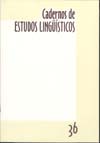Resumo
This paper discusses theoretical and empirical results of a research about the null subject parameter in terms of the acquisition theory. Assuming that BP language differs from Italian language in the value of the null subject parameter, we have to deal with a paradox: Brazilian children have information from declaratives that BP is a non pro-drop language, but are exposed to short answers, formed by a finite verb and the null subject, proposed to be a trigger (Kato 1994) for fixing the parameter. The aim of this paper is to provide evidence for other assertive sentences concerning the triggering problem. Building on it, we also describe some adult declarative sentences of both languages and compare them with the acquisiton data.Referências
ANTELMI, D. (1993) L’ipotesi maturazionale nell’acquisizione del linguaggio - Osservazione dallo studio longitudinale di una bambina italiana. Tese de doutorado, Università degli Studi di Padova.
CHOMSKY, N. (1981) Lectures on Government and Binding. Dordrecht: Foris (2a. ed. 1982)
CLAHSEN, H. (1989) “Constraints on parameter setting”, ms.
CYRINO, Sonia (1994) O objeto nulo no Português do Brasil: um estudo diacrônico. Tese de doutorado, UNICAMP.
De OLIVEIRA, M. (1995) “Sujeito nulo, uma propriedade sempre disponível para crianças de língua italiana?”, in “ABRALIN”, n.17.
De OLIVEIRA, M. (1996) Respostas assertivas e sua variação nas línguas românicas: seu papel na aquisição, tese de doutorado, UNICAMP.
DUARTE, E. (1995) A perda do princípio “Evite Pronome” no Português Brasileiro, Tese de doutorado, UNICAMP.
FERRARI, B. (1992) Sviluppo della Lingua Materna: Italiano e Tedesco a Cofnronto. Tese de doutorado, Università di Bergamo.
FODOR, J.A. (1966) “How to Learn to Talk: some simple ways”, in F. .Smith e G. Miller (org.) The Genesis of Language, Cambridge, Mass.
GALVES, C. (1993) “O enfraquecimento da concordância no português do Brasil”, in I. Roberts & M. Kato (orgs.) Português Brasileiro: uma viagem diacrônica, Campinas, Ed. da Unicamp.
HYAMS, N. (1986) The Acquisition of parametrized grammars, Unpublished PhD Dissertation, Cuny.
______. (1988) “Morphological Uniformity and the Setting of the Null Subject Parameter”, in “Proceedings of Nels”, 18, p.235-253.
KATO, M. & TARALLO, F. (1992) “Sim: respondendo afirmativamente em português”, in M. Sofia Z. de Paschoal & M. Antonieta A. Celani (orgs.) Lingüística Aplicada: da aplicação da lingüística à linguística transdisciplinar, São Paulo, Educ.
KATO, M. (1994) “A Theory of null objects and the development of a Brazilian child grammar”, in R.Tracy & E. Latley (eds.) How Tolerant is Universal Grammar, Tübingen: Editora Niemeyer.
_____. (1995a) “Gramática Infantil: competência plena ou uma gramática sem categorias funcionais?”, Anais da 47a. Reunião Anual da SBPC.
______. (1995b) “Tendências atuais na psicolingüística: o “input”desencadeador na aquisição”, CELSUL, Florianópolis, mimeo.
LIGHTFOOT, D. (1989) “The Child’s trigger experience: Degree-0 learnability”, in “Behavioral and Brain Sciences”, 12:2, p.321-334.
NEGRÃO, E. & MÜLLER, A. (1996) “As mudanças no sistema pronominal do Português Brasileiro”, in D.E.L.T.A., vol.12, n.1: 125-152.
NISHIGAUCHI, T. & ROEPER, T. (1987) “Deductive Parameters and the Growth of Empty Categories”, in Roeper, T. & Williams, E. (eds), Parameter Setting, op cit. p.91-121.
PINKER, S. (1989) “Language Acquisition”, in M.I. Posner (org.) Foundations of Cognitive Science, Cambridge, Mass.
POLLOCK, Y. (1989) “Verb Movement, Universal Grammar and the Structure of IP”, in LI, vol. 20, n.3.
WEXLER, K. & MANZINI, M. (1987) “Parameters and learnability”, in Roeper, T. & Williams, E. (eds) Parameter Setting. Dordrecht: D. Reidel.
O periódico Cadernos de Estudos Linguísticos utiliza a licença do Creative Commons (CC), preservando assim, a integridade dos artigos em ambiente de acesso aberto.

